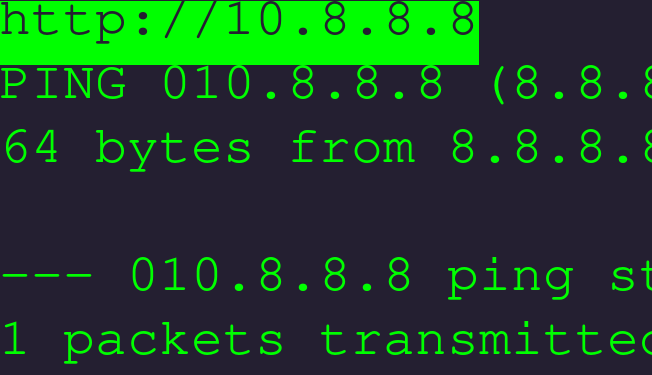Title
python stdlib “ipaddress” – Improper Input Validation of octal literals in python 3.8.0 thru v3.10 results in indeterminate SSRF & RFI vulnerabilities. — “ipaddress leading zeros in IPv4 address”
CVE ID
CVE-2021-29921
CVSS Score
9.8
CVSS:3.1/AV:N/AC:L/PR:N/UI:N/S:U/C:H/I:H/A:H
Internal ID
SICK-2021-014
Vendor
python
Product
ipaddress stdlib
Product Versions
3.8.0 thru v3.10
Vulnerability Details
Improper input validation of octal strings in Python 3.8.0 thru v3.10 stdlib ipaddress allows unauthenticated remote attackers to perform indeterminate SSRF, RFI, and LFI attacks on many programs that rely on Python stdlib ipaddress. IP address octects are left stripped instead of evaluated as valid IP addresses. For example, an attacker submitting an IP address to a web application that relies on stdlib ipaddress, could cause SSRF via inputting octal input data; An attacker can submit exploitable IP addresses if the octet is 3 digits, with the minimum exploitable octect being 08 (Denial of Service) and the maximum exploitable octet is 099. For example, an attacker can submit 010.8.8.8, which is 8.8.8.8, yet Python ipaddress builtin will evaluate this as 10.8.8.8.
Vendor Response
Currently unpatched – due to be addressed in next release.
Proof of Concept
Vulnerability added in python3.8
https://github.com/python/cpython/pull/12577
Documentated to be vulnerable in the changelog:
Stop rejecting IPv4 octets for being ambiguously octal. Leading zeros are ignored, and no longer are assumed to specify octal octets. Octets are always decimal numbers. Octets must still be no more than three digits, including leading zeroes.
#!/usr/bin/env python
# Authors: sickcodes, Victor Viale
# License: GPLv3+
# Reference: https://docs.python.org/3.10/library/ipaddress.html#ipaddress.IPv4Address
# Leading zeroes are tolerated only for values less than 8 (as there is no ambiguity between the decimal and octal interpretations of such strings).
import subprocess
import ipaddress
SUSPECT = '010.8.8.8'
print(ipaddress.ip_network(SUSPECT, strict=True))
BAD_IP = ipaddress.ip_address(SUSPECT)
print('http://'+str(BAD_IP))
print(str(subprocess.check_output("ping -W3 -v -c1 "+str(SUSPECT), shell=True, universal_newlines=True).strip()))
print(str(subprocess.check_output("ping -W3 -v -c1 "+str(BAD_IP), shell=True, universal_newlines=True).strip()))Disclosure Timeline
- 2019-03-20 – Issue created in https://bugs.python.org/issue36384
- 2021-03-29 – Researchers discover vulnerability
- 2021-03-29 – Vendor notified
- 2021-03-29 – CVE requested
- 2021-04-30 – CVE Assigned CVE-2021-29921 https://bugs.python.org/issue36384#msg392423
- 2021-04-30 – CVE published
Links
https://github.com/python/cpython
https://github.com/sickcodes/security/blob/master/advisories/SICK-2021-014.md
https://sick.codes/sick-2021-014
https://python-security.readthedocs.io/vuln/ipaddress-ipv4-leading-zeros.html
https://bugs.python.org/issue36384
https://docs.python.org/3/library/ipaddress.html
https://github.com/python/cpython/pull/12577
https://github.com/python/cpython/pull/25099
Researchers
Joel Croteau: https://github.com/TV4Fun
Victor Viale: https://github.com/koroeskohr || https://twitter.com/koroeskohr
Sick Codes: https://github.com/sickcodes || https://twitter.com/sickcodes
Kelly Kaoudis: https://github.com/kaoudis || https://twitter.com/kaoudis
John Jackson https://www.twitter.com/johnjhacking
Nick Sahler: https://github.com/nicksahler || https://twitter.com/tensor_bodega
Christian Heimes: https://github.com/tiran
Victor Stinner: https://github.com/vstinner
CVE Links
https://sick.codes/sick-2021-014
https://cve.mitre.org/cgi-bin/cvename.cgi?name=CVE-2021-29921



Hi there !
I may be at sea, but I wanted to know ; what’s the problem with this “vulnerability” ? What does it allow to do, knowing that ‘ipaddress’ just strips leading zeros in IP’s bytes while the ‘ping’ command seems to handle the leading zero in “010” as the octal value 8 ? I can’t understand why it is considered as a vulnerability…
я хакер
Is anyone else having deja vu, or is it just me?
Dates of assignment and disclosure seem to be mixed up in timeline.
Thanks fixed!
I’m still a little confused by the timeline. It currently reads:
2019-03-20 – Issue created in https://bugs.python.org/issue36384
2021-03-29 – Researchers discover vulnerability
2021-03-29 – Vendor notified
2021-03-29 – CVE requested
2021-04-30 – CVE Assigned CVE-2021-29921 https://bugs.python.org/issue36384#msg392423
I think it should read:
2019-03-20 – Researchers discover vulnerability
2021-03-20 – Issue created in https://bugs.python.org/issue36384
2021-03-20 – Vendor notified
2021-03-29 – CVE requested
2021-03-30 – Fix merged in to main code branch
2021-04-30 – CVE Assigned CVE-2021-29921 https://bugs.python.org/issue36384#msg392423
I would argue that if a vendor has a bug report on a publicly available bug tracking system, then the vendor has been notified. In fact, looking at bug 392423, I see that Joel Croteau started working on the problem March 20th. I see that Nick Coghlan merged the fix into python 3.8.
The reason why I am being pedantic about this is because I want an organization that is open and honest to be lauded when they respond to an obscure problem quickly.
Hey Jeff,
Thanks for reaching out, we didn’t originally know that Joel has created an issue 2 years prior, on 2019-03-20.
2021-03-20 – Issue created in https://bugs.python.org/issue36384It’s confusing as it was exactly 2 years between initial issue and fix.
What ended up happening was Joel created the issue in March 2019, then a half fix was applied here Aug 30, 2019, https://github.com/python/cpython/blob/63298930fb531ba2bb4f23bc3b915dbf1e17e9e1/Misc/NEWS.d/3.8.0a4.rst
Stop rejecting IPv4 octets for being ambiguously octal. Leading zeros are ignored, and no longer are assumed to specify octal octets. Octets are always decimal numbers. Octets must still be no more than three digits, including leading zeroes.
However it was still vulnerable as indicated by the changelog.
Then there was this message: https://bugs.python.org/issue36384#msg389826
Which refers directly to our other CVE-2021-28918: https://github.com/sickcodes/security/blob/master/advisories/SICK-2021-011.md
Which goes into detail here: https://sick.codes/universal-netmask-npm-package-used-by-270000-projects-vulnerable-to-octal-input-data-server-side-request-forgery-remote-file-inclusion-local-file-inclusion-and-more-cve-2021-28918/
We submitted all of them on pretty much the same day, and then a week or so ago the CVE was assigned.
I’d say it took a while, 2 years to fix, which is where the “discovered vulnerability” part comes into play.
vstinner was right though, within 1 day of publishing this (as soon as we saw he had posted the CVE publicly) there was a fix available.
Let me know if I’m missing something, but yeah there’s a 2 year gap between issue opening and the actual fix, jumpstarted by CVE-2021-28918 and then this received CVE-2021-29921.
We submitted both xD